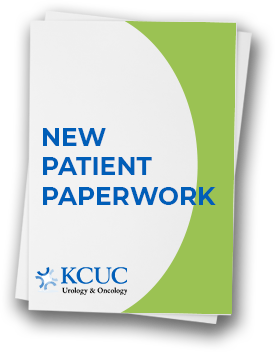Testosterone deficiency, or male hypogonadism, is a condition where the serum testosterone levels are below normal. Testosterone is produced by the Leydig cells in the testicles and is regulated by hormones produced in the hypothalamus/pituitary gland axis. (LH and FSH). Testosterone plays an important role in male sexual and physical development and also maintains energy levels, fertility, sex drive, and bone health in adults. Some decline in testosterone production is normal as men age. When low testosterone become symptomatic then treatment, usually replacement with supplemental testosterone, may be effective.
With over 20 experienced urologist and testosterone deficiency doctors office locations in Kansas and Missouri, the doctors at Kansas City Urology Care proudly offer low testosterone treatment options in Kansas City, Overland Park, Emporia, Grandview, Leavenworth, Clinton, Liberty, Olathe, Lexington, Harrisonville, Lee’s Summit, North, KC, Independence, MO, and the entire KC metro.
Types of Hypogonadism
Male hypogonadism can be primary or secondary. Primary hypogonadism is a condition where the testes do not make adequate testosterone although the releasing hormones from the brain are normal. This could be caused by injury, disease or other factors affecting the testes. Secondary hypogonadism results from disorders or injuries affecting the centers in the brain that control hormone production (hypothalamus or pituitary gland).
Risk Factors of Low T & Testosterone Deficiency
Testosterone deficiency (aka Low T) can be caused by:
- Chemotherapy or radiation therapy
- Aging — about 30% of men older than 75 experience low testosterone levels
- Obesity
- Type II diabetes
- Infections such as meningitis, syphilis, mumps
- Undescended testes
- Klinefelter’s syndrome (an extra X chromosome causes underdeveloped testes)
- Damage to the testes or brain caused by injury, tumors or surgery
- Kallman syndrome — abnormal hypothalamus development
- HIV/AIDS
- Some inflammatory disorders such as tuberculosis or sarcoidosis
Symptoms
Adult-onset hypogonadism can produce one or more of these symptoms:
- Decreased libido (sex drive)
- Erectile dysfunction (impotence)
- Growth in breast tissue (gynecomastia)
- Infertility
- Muscle weakness or fatigue
- Bone loss
- Diminished growth or loss of body hair
- Depression or other mood disorders
Congenital hypogonadism (present at birth) can cause undeveloped, ambiguous or underdeveloped genitalia. Onset during puberty can prevent normal male adolescent development, such as deepening of the voice, hair growth, and muscle and sex organ development.
Diagnosis
Blood tests can determine the level of testosterone and or brain hormones in your bloodstream. Testing is usually done in the morning when testosterone levels are highest.
Low Testosterone Treatment
Primary hypogonadism often is treated with testosterone replacement therapy (TRT). Testosterone is not readily absorbed intact when taken orally. However, testosterone can be delivered through a number of different methods, each of which is effective at raising serum testosterone levels. Cost, side effects and personal preference may determine which of the following is best Kansas City testosterone deficiency treatment for you:
- An Implant— Testopel is a brief office procedure where small testosterone-releasing pellets are implanted under local anesthesia into the soft tissues of the thigh or buttocks. These pellets increase testosterone to normal levels and slowly dissolve over 4-6 months at which time the procedure is repeated.
- A gel — a measured amount of absorbable testosterone gel is applied to the skin daily and raises the testosterone into the normal range. It is well-tolerated and most closely mimics normal production.
- Intramuscular injection — An injection of testosterone solution is typically given every two weeks at home or in the doctor’s office. Family members can learn to give the injections. This is probably the least costly, but testosterone levels may fluctuate widely between injections causing energy levels to rise and fall. It can be stressful to the liver and in some patients, cause the red blood cell count to rise into harmful levels. This is the least ideal method of replacement.
Secondary hypogonadism that is caused by pituitary disorders may be treated with pituitary hormones. A pituitary tumor may be treated surgically or with radiation or medication.
Caution – In January 2014, two studies were published which found that in men over age 65 and those with a history of heart problems were at increased risk of cardiovascular events, like heart attack, when using supplemental testosterone. Men over the age of 65 and those with heart history should check with their cardiologist before starting testosterone replacement therapy.

